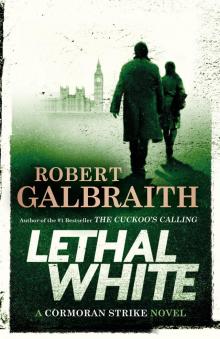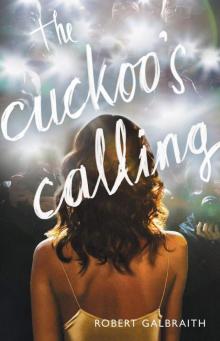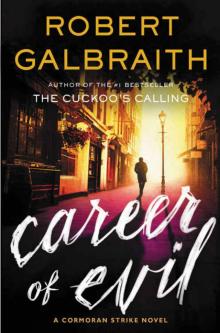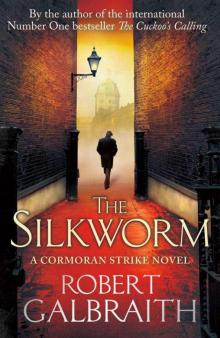- Home
- Robert Galbraith
The Cuckoo's Calling Page 3
The Cuckoo's Calling Read online
Page 3
He picked up his cup clumsily; his hands were trembling so much that coffee slopped over the edge on to his sharply pressed suit trousers.
“What exactly is it that you would like me to do for you?” Strike asked.
Bristow replaced the cup shakily on the desk, then gripped his hands together tightly.
“They say my sister killed herself. I don’t believe it.”
Strike remembered the television pictures: the black body bag on a stretcher, flickering in a storm of camera flashes as it was loaded into an ambulance, the photographers clustering around as it started to move, holding up their cameras to the dark windows, white lights bouncing off the black glass. He knew more about the death of Lula Landry than he had ever meant or wanted to know; the same would be true of virtually any sentient being in Britain. Bombarded with the story, you grew interested against your will, and before you knew it, you were so well informed, so opinionated about the facts of the case, you would have been unfit to sit on a jury.
“There was an inquest, wasn’t there?”
“Yes, but the detective in charge of the case was convinced from the outset that it was suicide, purely because Lula was on lithium. The things he overlooked—they’ve even spotted some of them on the internet.”
Bristow jabbed a nonsensical finger at Strike’s bare desktop, where a computer might have been expected to stand.
A perfunctory knock and the door opened; Robin strode in, handed Strike a folded note and withdrew.
“Sorry, d’you mind?” said Strike. “I’ve been waiting for this message.”
He unfolded the note against his knee, so that Bristow could not see through the back, and read:
Lula Landry was adopted by Sir Alec and Lady Yvette Bristow when she was four. She grew up as Lula Bristow but took her mother’s maiden name when she started modeling. She has an older brother called John, who is a lawyer. The girl waiting outside is Mr. Bristow’s girlfriend and a secretary at his firm. They work for Landry, May, Patterson, the firm started by Lula and John’s maternal grandfather. The photograph of John Bristow on LMP’s home page is identical to the man you’re talking to.
Strike crumpled the note and dropped it into the waste-paper basket at his feet. He was staggered. John Bristow was not a fantasist; and he, Strike, appeared to have been sent a temp with more initiative, and better punctuation, than any he had ever met.
“Sorry, go on,” he said to Bristow. “You were saying—about the inquest?”
“Yeah,” said Bristow, dabbing the end of his nose with the wet handkerchief. “Well, I’m not denying that Lula had problems. She put Mum through hell, as a matter of fact. It started around the same time our father died—you probably know all this, God knows there was enough about it in the press…but she was expelled from school for dabbling in drugs; she ran off to London, Mum found her living rough with addicts; the drugs exacerbated the mental problems; she absconded from a treatment center—there were endless scenes and dramas. In the end, though, they realized she had bipolar disorder and put her on the right medication, and ever since then, as long as she was taking her tablets, she was fine; you’d never have known there was anything wrong with her. Even the coroner accepted that she had been taking her medication, the autopsy proved it.
“But the police and the coroner couldn’t see past the girl who had a history of poor mental health. They insisted that she was depressed, but I can tell you myself that Lula wasn’t depressed at all. I saw her on the morning before she died, and she was absolutely fine. Things were going very well for her, particularly career-wise. She’d just signed a contract that would have brought in five million over two years; she asked me to look over it for her, and it was a bloody good deal. The designer was a great friend of hers, Somé, I expect you’ve heard of him? And she was booked solid for months; there was a shoot in Morocco coming up, and she loved the traveling. So you see, there was no reason whatsoever for her to take her own life.”
Strike nodded politely, inwardly unimpressed. Suicides, in his experience, were perfectly capable of feigning an interest in a future they had no intention of inhabiting. Landry’s rosy, golden-hued morning mood might easily have turned dark and hopeless in the day and half a night that had preceded her death; he had known it happen. He remembered the lieutenant in the King’s Royal Rifle Corps, who had risen in the night after his own birthday party, of which, by all accounts, he had been the life and soul. He had penned his family a note, telling them to call the police and not go into the garage. The body had been found hanging from the garage ceiling by his fifteen-year-old son, who had not noticed the note as he hurried through the kitchen on the way to fetch his bicycle.
“That’s not all,” said Bristow. “There’s evidence, hard evidence. Tansy Bestigui’s, for a start.”
“She was the neighbor who said she heard an argument upstairs?”
“Exactly! She heard a man shouting up there, right before Lula went over the balcony! The police rubbished her evidence, purely because—well, she’d taken cocaine. But that doesn’t mean she didn’t know what she’d heard. Tansy maintains to this day that Lula was arguing with a man seconds before she fell. I know, because I’ve discussed it with her very recently. Our firm is handling her divorce. I’m sure I’d be able to persuade her to talk to you.
“And then,” said Bristow, watching Strike anxiously, trying to gauge his reaction, “there was the CCTV footage. A man walking towards Kentigern Gardens about twenty minutes before Lula fell, and then footage of the same man running hell for leather away from Kentigern Gardens after she’d been killed. They never found out who he was; never managed to trace him.”
With a kind of furtive eagerness, Bristow now drew from an inside pocket of his jacket a slightly crumpled clean envelope and held it out.
“I’ve written it all down. The timings and everything. It’s all in here. You’ll see how it fits together.”
The appearance of the envelope did nothing to increase Strike’s confidence in Bristow’s judgment. He had been handed such things before: the scribbled fruits of lonely and misguided obsessions; one-track maunderings on pet theories; complex timetables twisted to fit fantastic contingencies. The lawyer’s left eyelid was flickering, one of his knees was jerking up and down and the fingers proffering the envelope were trembling.
For a few seconds Strike weighed these signs of strain against Bristow’s undoubtedly hand-made shoes, and the Vacheron Constantin watch revealed on his pale wrist when he gesticulated. This was a man who could and would pay; perhaps long enough to enable Strike to clear one installment of the loan that was the most pressing of his debts. With a sigh, and an inner scowl at his own conscience, Strike said:
“Mr. Bristow—”
“Call me John.”
“John…I’m going to be honest with you. I don’t think it would be right to take your money.”
Red blotches blossomed on Bristow’s pale neck, and on the undistinguished face, as he continued to hold out the envelope.
“What do you mean, it wouldn’t be right?”
“Your sister’s death was probably as thoroughly investigated as anything can be. Millions of people, and media from all over the world, were following the police’s every move. They would have been twice as thorough as usual. Suicide is a difficult thing to have to accept—”
“I don’t accept it. I’ll never accept it. She didn’t kill herself. Someone pushed her over that balcony.”
The drill outside stopped suddenly, so that Bristow’s voice rang loudly through the room; and his hair-trigger fury was that of a meek man pushed to his absolute limit.
“I see. I get it. You’re another one, are you? Another fucking armchair psychologist? Charlie’s dead, my father’s dead, Lula’s dead and my mother’s dying—I’ve lost everyone, and I need a bereavement counselor, not a detective. D’you think I haven’t heard it about a hundred fucking times before?”
Bristow stood up, impressive for all his rabbity teeth and blot
chy skin.
“I’m a pretty rich man, Strike. Sorry to be crass about it, but there you are. My father left me a sizeable trust fund. I’ve looked into the going rate for this kind of thing, and I would have been happy to pay you double.”
A double fee. Strike’s conscience, once firm and inelastic, had been weakened by repeated blows of fate; this was the knockout punch. His baser self was already gamboling off into the realms of happy speculation: a month’s work would give him enough to pay off the temp and some of the rent arrears; two months, the more pressing debts…three months, a chunk of the overdraft gone…four months…
But John Bristow was speaking over his shoulder as he moved towards the door, clutching and crumpling the envelope that Strike had refused to take.
“I wanted it to be you because of Charlie, but I found out a bit about you, I’m not a complete bloody idiot. Special investigation branch, military police, wasn’t it? Decorated as well. I can’t say I was impressed by your offices,” Bristow was almost shouting now, and Strike was aware that the muffled female voices in the outer office had fallen silent, “but apparently I was wrong, and you can afford to turn down work. Fine! Bloody forget it. I’m sure I’ll find somebody else to do the job. Sorry to have troubled you!”
4
THE MEN’S CONVERSATION HAD BEEN carrying, with increasing clarity, through the flimsy dividing wall for a couple of minutes; now, in the sudden silence following the cessation of the drill, Bristow’s words were plainly audible.
Purely for her own amusement, in the high spirits of this happy day, Robin had been trying to act convincingly the part of Strike’s regular secretary, and not to give away to Bristow’s girlfriend that she had only been working for a private detective for half an hour. She concealed as best she could any sign of surprise or excitement at the outbreak of shouting, but she was instinctively on Bristow’s side, whatever the cause of the conflict. Strike’s job and his black eye had a certain beaten-up glamour, but his attitude towards her was deplorable, and her left breast was still sore.
Bristow’s girlfriend had been staring at the closed door ever since the men’s voices had first become audible over the noise of the drill. Thick-set and very dark, with a limp bob and what might have been a monobrow if she had not plucked it, she looked naturally cross. Robin had often noticed how couples tended to be of roughly equivalent personal attractiveness, though of course factors such as money often seemed to secure a partner of significantly better looks than oneself. Robin found it endearing that Bristow, who on the evidence of his smart suit and his prestigious firm could have set his sights on somebody much prettier, had chosen this girl, who she assumed was warmer and kinder than her appearance suggested.
“Are you sure you wouldn’t like a coffee, Alison?” she asked.
The girl looked around as though surprised at being spoken to, as though she had forgotten that Robin was there.
“No thanks,” she said, in a deep voice that was surprisingly melodious. “I knew he’d get upset,” she added, with an odd kind of satisfaction. “I’ve tried to talk him out of doing this, but he wouldn’t listen. Sounds like this so-called detective is turning him down. Good for him.”
Robin’s surprise must have shown, because Alison went on, with a trace of impatience:
“It’d be better for John if he’d just accept the facts. She killed herself. The rest of the family have come to terms with it, I don’t know why he can’t.”
There was no point pretending that she did not know what the woman was talking about. Everyone knew what had happened to Lula Landry. Robin could remember exactly where she had been when she had heard that the model had dived to her death on a sub-zero night in January: standing at the sink in the kitchen of her parents’ house. The news had come over the radio, and she had emitted a little cry of surprise, and run out of the kitchen in her nightshirt to tell Matthew, who was staying for the weekend. How could the death of someone you had never met affect you so? Robin had greatly admired Lula Landry’s looks. She did not much like her own milkmaid’s coloring: the model had been dark, luminous, fine-boned and fierce.
“It hasn’t been very long since she died.”
“Three months,” said Alison, shaking out her Daily Express. “Is he any good, this man?”
Robin had noticed Alison’s contemptuous expression as she took in the dilapidated condition, and undeniable grubbiness, of the little waiting room, and she had just seen, online, the pristine, palatial office where the other woman worked. Her answer was therefore prompted by self-respect rather than any desire to protect Strike.
“Oh yes,” she replied coolly. “He’s one of the best.”
She slit open a pink, kitten-embellished envelope with the air of a woman who daily dealt with exigencies much more complex and intriguing than Alison could possibly imagine.
Meanwhile, Strike and Bristow were facing each other across the inner room, the one furious, the other trying to find a way to reverse his position without jettisoning his self-respect.
“All I want, Strike,” said Bristow hoarsely, the color high in his thin face, “is justice.”
He might have struck a divine tuning fork; the word rang through the shabby office, calling forth an inaudible but plangent note in Strike’s breast. Bristow had located the pilot light Strike shielded when everything else had been blown to ashes. He stood in desperate need of money, but Bristow had given him another, better reason to jettison his scruples.
“OK. I understand. I mean it, John; I understand. Come back and sit down. If you still want my help, I’d like to give it.”
Bristow glared at him. There was no noise in the office but the distant shouts of the workmen below.
“Would you like your—er, wife, is she?—to come in?”
“No,” said Bristow, still tense, with his hand on the doorknob. “Alison doesn’t think I ought to be doing this. I don’t know why she wanted to come along, actually. Probably hoping you’d turn me down.”
“Please—sit down. Let’s go over this properly.”
Bristow hesitated, then moved back towards his abandoned chair.
His self-restraint crumbling at last, Strike took a chocolate biscuit and crammed it, whole, into his mouth; he took an unused notepad from his desk drawer, flicked it open, reached for a pen and managed to swallow the biscuit in the time it took Bristow to resume his seat.
“Shall I take that?” he suggested, pointing to the envelope Bristow was still clutching.
The lawyer handed it over as though unsure he could trust Strike with it. Strike, who did not wish to to peruse the contents in front of Bristow, put it aside with a small pat, which was intended to show that it was now a valued component of the investigation, and readied his pen.
“John, if you could give me a brief outline of what happened on the day your sister died, it would be very helpful.”
By nature methodical and thorough, Strike had been trained to investigate to a high and rigorous standard. First, allow the witness to tell their story in their own way: the untrammeled flow often revealed details, apparent inconsequentialities, that would later prove invaluable nuggets of evidence. Once the first gush of impression and recollection had been harvested, then it was time to solicit and arrange facts rigorously and precisely: people, places, property…
“Oh,” said Bristow, who seemed, after all his vehemence, unsure where to start, “I don’t really…let’s see…”
“When was the last time you saw her?” Strike prompted.
“That would have been—yes, the morning before she died. We…we had an argument, as a matter of fact, though thank God we made it up.”
“What time was this?”
“It was early. Before nine, I was on my way in to the office. Perhaps a quarter to nine?”
“And what did you argue about?”
“Oh, about her boyfriend, Evan Duffield. They’d just got back together again. The family had thought it was over and we’d been so pleased. He’s a horri
ble person, an addict and a chronic self-publicist; about the worst influence on Lula you could imagine.
“I might have been a bit heavy-handed, I—I see that now. I was eleven years older than Lula. I felt protective of her, you know. Perhaps I was bossy at times. She was always telling me that I didn’t understand.”
“Understand what?”
“Well…anything. She had lots of issues. Issues with being adopted. Issues with being black in a white family. She used to say I had it easy…I don’t know. Perhaps she was right.”
He blinked rapidly behind his glasses. “The row was really the continuation of a row we’d had on the telephone the night before. I just couldn’t believe she’d been so stupid as to go back to Duffield. The relief we all felt when they split up…I mean, given her own history with drugs, hooking up with an addict…” He drew breath. “She didn’t want to hear it. She never did. She was furious with me. She’d actually given instructions to the security man at the flats not to let me past the front desk next morning, but—well, Wilson waved me through anyway.”
Humiliating, thought Strike, to have to rely on the pity of doormen.
“I wouldn’t have gone up,” said Bristow miserably, blotches of color dappling his thin neck again, “but I had the contract with Somé to give back to her; she’d asked me to look over it and she needed to sign it…She could be quite blasé about things like that. Anyway, she wasn’t too happy that they’d let me upstairs, and we rowed again, but it burned itself out quite quickly. She calmed down.
“So then I told her that Mum would appreciate a visit. Mum had just got out of hospital, you see. She’d had a hysterectomy. Lula said she might pop in and see her later, at her flat, but that she couldn’t be sure. She had things on.”
Bristow took a deep breath; his right knee started jiggling up and down again and his knobble-knuckled hands washed each other in dumb show.
“I don’t want you to think badly of her. People thought her selfish, but she’d been the youngest in the family and rather indulged, and then she was ill and, naturally, the center of attention, and then she was plunged into this extraordinary life where things, people, revolved around her, and she was pursued everywhere by the paparazzi. It wasn’t a normal existence.”

 Lethal White
Lethal White The Cuckoo's Calling
The Cuckoo's Calling Career of Evil
Career of Evil The Silkworm
The Silkworm